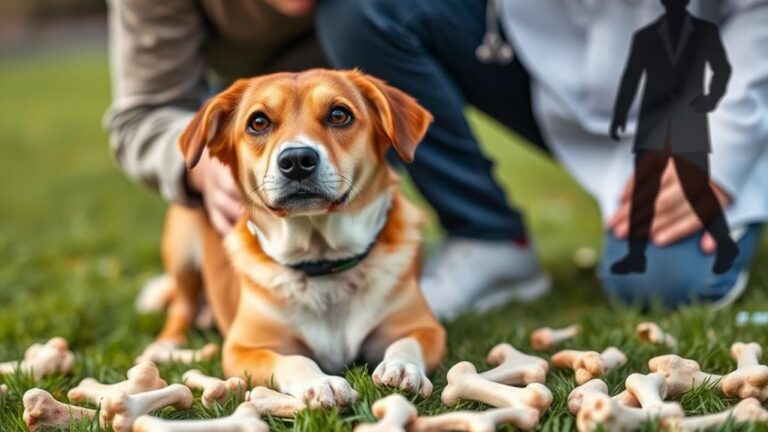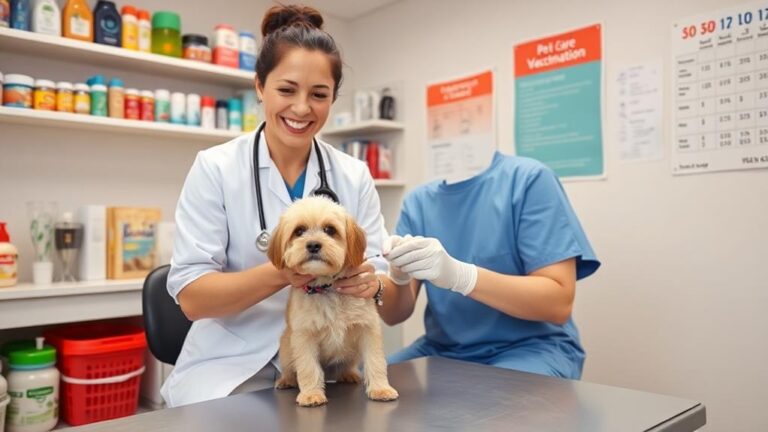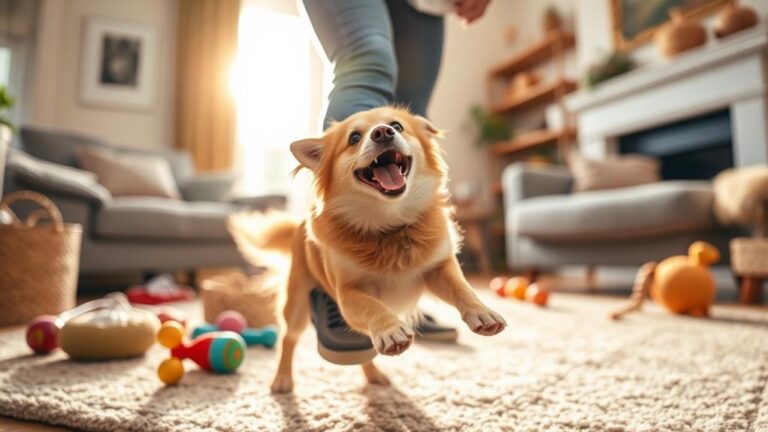If your dog ate chicken bones, it's important to act quickly. Cooked bones can splinter and cause choking or even puncture their insides. Watch for signs like vomiting, loss of appetite, or unusual behavior. Most dogs can pass bones within 24 hours, but if you notice distress or haven't seen a bowel movement in two days, you should contact your vet. Feeding them soft foods like plain bread might help ease their stomach. Always be cautious in the future, as cooked bones pose serious risks. You might find other helpful tips to guarantee your dog stays safe.
Risks of Eating Chicken Bones
When you're enjoying a meal with chicken, it's crucial to remember that those bones can pose serious risks to your dog.
Cooked chicken bones can splinter easily. If your dog swallows a piece, it could choke or get stuck in their throat. This can lead to severe pain or even death.
The bones might also puncture the gastrointestinal tract, creating dangerous situations. You may notice your dog acting strangely or refusing to eat.
Blockages in the digestive tract are also possible, which can be life-threatening. If your dog gets into chicken bones, don't wait.
Seek veterinary help right away. It's better to be safe than sorry when it comes to your furry friend's health.
Symptoms and Timing of Illness
After your dog eats chicken bones, it's important to keep a close eye on them for any signs of trouble.
Symptoms can show up quickly or take a couple of days. Watch for vomiting, loss of appetite, or unusual behavior. If your dog seems restless or uncomfortable, that could be a red flag.
Most dogs pass the bones within 24 hours, but some may take longer. If your dog hasn't had a bowel movement in over two days, it's wise to consult your vet.
Dietary Recommendations Post-Ingestion
If your dog has eaten chicken bones, you might be wondering what to feed them next. Start with soft foods, like plain bread, to cushion their stomach.
High-fiber options, such as pumpkin, can help with digestion. It's best to give these foods immediately after the incident to ease any discomfort.
Avoid feeding your dog cooked bones in the future, as they can cause serious health risks. Make sure to monitor their behavior and appetite closely for any changes.
If you're unsure about what to feed or if your dog shows signs of distress, don't hesitate to consult your veterinarian. They can provide specific dietary advice tailored to your dog's needs during this time.
Signs of Internal Issues
Five key signs can indicate your dog is facing internal issues after eating chicken bones.
First, watch for weakness or lethargy. If your pup seems unusually tired or doesn't want to play, that's a red flag.
Next, check their gums. Pale gums can signal internal bleeding.
A distended abdomen is another concern—it might feel hard or swollen when you touch it.
Vomiting is common, especially if they're struggling to digest something sharp.
Finally, trouble breathing can indicate serious problems.
If you notice any of these signs, it's essential to seek veterinary help immediately. Don't wait—your dog's health depends on it!
Being vigilant can make a huge difference in their recovery.
Digestion and Bone Management
When it comes to digestion and bone management, understanding how your dog processes chicken bones is essential.
Generally, bones can take anywhere from 8 to 12 hours to digest, but it might take up to 24 hours for some dogs. Since cooked bones can splinter, they pose a risk. It's best to supervise your dog while chewing and remove any bones after 10 to 15 minutes.
If your dog swallows a bone, watch for signs of distress. You might notice changes in their appetite or behavior. Always dispose of bones after a few days to avoid health risks.
If you're concerned, don't hesitate to consult your vet for advice and peace of mind regarding your dog's digestion.
Conclusion
If your dog ate chicken bones, stay calm and keep a close eye on them. Watch for signs of distress, like vomiting or lack of appetite. Offer soft foods to help their tummy but avoid cooked bones in the future. Always check with your vet if you're worried or notice unusual behavior. Acting quickly can make a big difference in keeping your furry friend safe and healthy. Your care and attention are what matter most right now!



